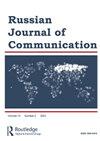俄罗斯的政治笑话可以作为研究弗拉基米尔·普京(Vladimir Putin)在社会上的形象变化的基础
Q1 Social Sciences
引用次数: 0
摘要
本文的目的是分析关于弗拉基米尔·普京的笑话,并展示2014年至2018年间人们对他的行为和行为的看法是如何变化的。2014年3月俄罗斯吞并克里米亚标志着这一分析的起点,并在2018年12月结束,也就是普京第四次当选俄罗斯总统的那一年的年底。来自门户网站anekdot.ru的350多个笑话按主题进行了分类,并使用两种类型进行了分析:笑话的类型和对总统角色的评估。将这两种分类结合起来的策略,可以更容易地准确评估总统在这些笑话中扮演的角色。本文章由计算机程序翻译,如有差异,请以英文原文为准。
Russian political jokes as a basis for research into changes in how Vladimir Putin is perceived by society
ABSTRACT The aim of this paper is to analyse jokes about Vladimir Putin and show how people’s perception of his actions and behaviour changed between 2014 and 2018. The annexation of Crimea by Russia in March 2014 marks the starting point of this analysis, and it ends in December 2018, at the end of the year in which Putin was elected President of Russia for the fourth time. More than 350 jokes from the portal anekdot.ru have been divided up thematically and analysed using two typologies: the kind of joke and assessment of the president's role. The strategy of combining these two classifications makes it easier to evaluate precisely the roles of the president that emerge from these jokes.
求助全文
通过发布文献求助,成功后即可免费获取论文全文。
去求助
来源期刊

Russian Journal of Communication
Social Sciences-Political Science and International Relations
自引率
0.00%
发文量
0
期刊介绍:
Russian Journal of Communication (RJC) is an international peer-reviewed academic publication devoted to studies of communication in, with, and about Russia and Russian-speaking communities around the world. RJC welcomes both humanistic and social scientific scholarly approaches to communication, which is broadly construed to include mediated information as well as face-to-face interactions. RJC seeks papers and book reviews on topics including philosophy of communication, traditional and new media, film, literature, rhetoric, journalism, information-communication technologies, cultural practices, organizational and group dynamics, interpersonal communication, communication in instructional contexts, advertising, public relations, political campaigns, legal proceedings, environmental and health matters, and communication policy.
 求助内容:
求助内容: 应助结果提醒方式:
应助结果提醒方式:


